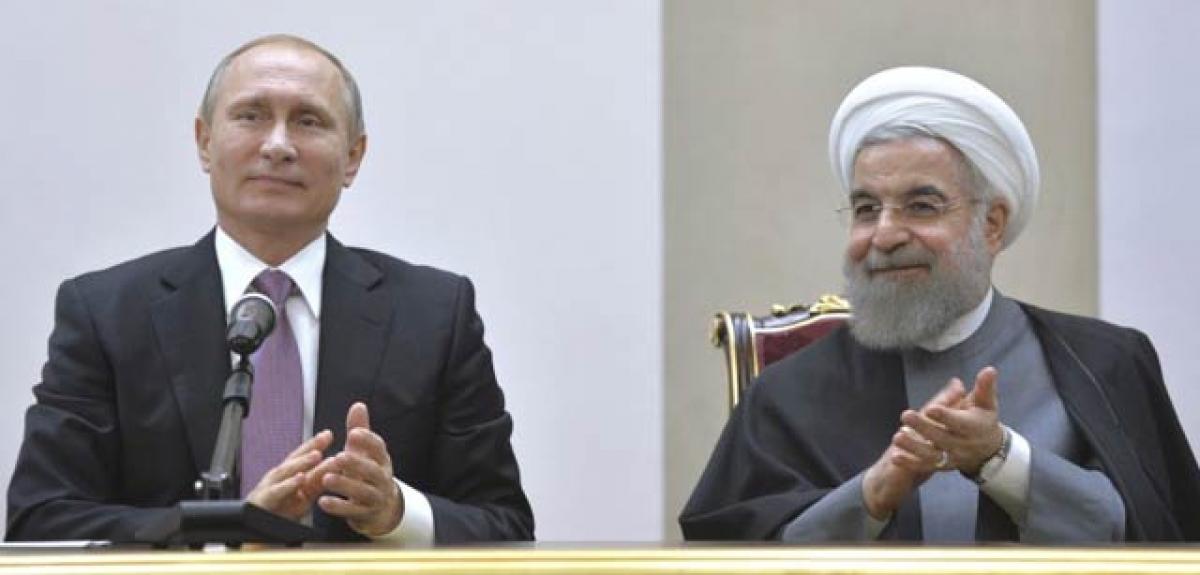Live
- Velapalli, Bonda Uma engage in war of words on stone incident
- Accused in stone pelting case arrested
- AAP Nominates Mayor and Deputy Mayor Candidates For Delhi MCD Elections
- Hyderabad: Eatala, Raghunandan, DK Aruna file nomination papers
- Chandrababu to hold Praja Galam election campaign in Kurnool today
- Rajasthan CM casts his vote, says BJP will repeat history
- Ex-MP CM Kamal Nath, son Nakul Nath cast votes in Chhindwara
- Hyderabad: HC directs police to permit Hanuman Vijaya Yatra rally with 100 bikes on April 23
- LS polls: PM Modi to campaign in UP, MP and Maharashtra today
- ‘Narmada Pushkara Kshetra Darsini’ book released
Just In

When Iran took delivery of the first parts of an advanced Russian air defence system this month, it paraded the anti-aircraft missile launchers sent by Moscow to mark the Army Day.
Dubai/Moscow : When Iran took delivery of the first parts of an advanced Russian air defence system this month, it paraded the anti-aircraft missile launchers sent by Moscow to mark the Army Day. Tehran had cause to celebrate: the Kremlin's decision a year ago to press ahead with the stalled sale of the S-300 system was the first clear evidence of a growing partnership between Russia and Iran that has since turned the tide in Syria's civil war and is testing US influence in the Middle East.
But the delay in implementation of the deal also points to the limitations of a relationship that is forged from a convergence of interests rather than a shared worldview, with Iran's leadership divided over ideology and Russia showing signs of reluctance to let the alliance develop much more, according to diplomats, officials and analysts interviewed by Reuters.
Some Iranian officials want a strategic alliance, a much deeper relationship than now. But the Kremlin refers only to ongoing cooperation with a new dimension because of the conflict in Syria, in which both back Damascus. "We are continuously developing friendly relations with Iran, but we cannot really talk about a new paradigm in our relations," Kremlin spokesman Dmitry Peskov said last month.
Russia agreed to sell the S-300 system to Iran in 2007 but froze the deal in 2010 after sanctions were imposed on Tehran over its nuclear programme. Moscow lifted the self-imposed ban in April last year as Iran and world powers got closer to the deal that led eventually to the nuclear-related sanctions being lifted in exchange for Tehran curbing its atomic programme.
Russia is now weighing the financial and diplomatic benefits of arms sales to Tehran against the risk of upsetting other countries including Saudi Arabia, the United States and Israel, or seeing Iran become too powerful. "There is a military-economic aspect to this alliance which is beneficial to both sides," said Maziar Behrooz, associate professor of Mideast and Islamic history at San Francisco State University, who has studied Iran's relationship with Russia.
"But on a geopolitical level, Iran and Russia can only form a tactical short-term alliance, not a strategic one. I think the ideological differences between the two are just too deep." There is little sign so far of Russian companies making new inroads into Iran. This is partly for ideological reasons. The Iranian establishment is divided, with President Hassan Rouhani's faction more interested in trading with the West than struggling against it, even if many US policies are still condemned.
Russia has little incentive to join the mostly Shi'ite "Axis of Resistance" to Western interests in the region which is championed by the more conservative Iranian faction as this could ruin its relationships with other Middle Eastern powers such as Israel, Saudi Arabia and Egypt.
Some Iranian officials are also wary of getting too close to Russia, which fought Britain for domination of 19th century Iran and occupied the country during both World Wars.
Russia is also in talks to help upgrade Iran's dilapidated air force by selling it Sukhoi Su-30 fighter jets but the deal would need the approval of the United Nations Security Council and could further strain Moscow's relations with Israel, Saudi Arabia and the United States.
By Bozorgmehr Sharafedin & Lidia Kelly

© 2024 Hyderabad Media House Limited/The Hans India. All rights reserved. Powered by hocalwire.com







